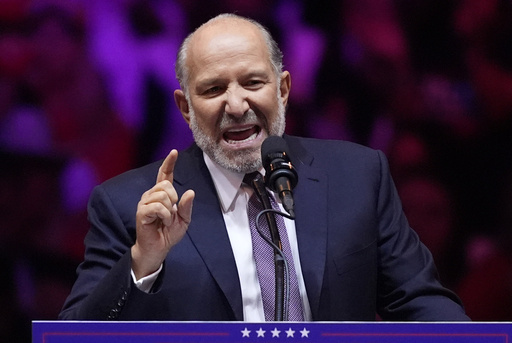
WASHINGTON — President-elect Donald Trump has put forward Howard Lutnick, the CEO of Cantor Fitzgerald and an advocate for cryptocurrency, as his nominee for the position of Secretary of Commerce. This nomination would place Lutnick at the helm of a vast government agency responsible for various functions, including financing new semiconductor manufacturing plants, enforcing trade policies, disseminating economic data, and even weather monitoring. The role is critical and requires solid connections with business leaders and the corporate sector.
Lutnick, a co-chair of Trump’s transition team alongside Linda McMahon, who previously headed the Small Business Administration, has made numerous appearances in Trump’s life, including a stint on the former president’s NBC reality show, “The Apprentice.” His close ties to Trump have solidified his status within the president-elect’s select group of advisors.
Here are key points about Lutnick, who, pending Senate confirmation, could lead the Department of Commerce.
Lutnick was supported by Elon Musk for the Treasury Department position. Recently, Musk and others associated with Trump urged him to replace Scott Bessent, the initial frontrunner for secretary of the treasury, with Lutnick. Musk labeled Bessent as a “business-as-usual choice,” while advocating that Lutnick would be more inclined to foster real change. The debate around the treasury position has sparked intense interest within financial sectors, where the introduction of a disruptive candidate could influence stock market stability — a primary concern for Trump. Lutnick is among the notable contenders for this role, which also includes Bessent, former Federal Reserve governor Kevin Warsh, Marc Rowan from Apollo Global Management, and Tennessee Senator Bill Hagerty, who previously served as Trump’s ambassador to Japan.
Lutnick has expressed strong support for Trump’s proposed tariffs. During his campaign, Trump suggested imposing a 60% tariff on Chinese goods and a tariff of up to 20% on all other imports. He framed these tariffs as both a strategy for negotiating better trade agreements and as a means of raising funding for tax cuts. In a CNBC interview in September, Lutnick voiced his approval of the tariffs, stating, “Tariffs are an amazing tool for the president to use — we need to protect the American worker.” However, many mainstream economists view tariffs skeptically, arguing they are an ineffective means for governments to stimulate economic growth.
A significant aspect of Lutnick’s background includes the tragic events of September 11, 2001, when he lost his brother Gary and 658 of the 960 employees at Cantor Fitzgerald in the terrorist attacks on the World Trade Center. The firm faced devastating losses that day, prompting Lutnick to serve on the Board of Directors of the National September 11 Memorial & Museum and the Partnership for New York City. In 2013, Cantor Fitzgerald settled a wrongful death suit related to the attacks for $135 million, after which Lutnick reflected on the experience, stating, “We could never, and will never, consider it ordinary.” Trump’s announcement about Lutnick’s appointment acknowledged his resilience amid sorrow, highlighting his embodiment of perseverance in the face of such a catastrophic loss.
In addition to his business ventures, Lutnick is a notable supporter of cryptocurrency. He advocates for furthering the objectives of the cryptocurrency market, particularly around Tether, a well-known digital asset. Cryptocurrencies allow online trading without the necessity of the traditional banking system and have gained popularity, with Bitcoin being the most recognized virtual currency. At a cryptocurrency conference earlier this year, Lutnick stated, “Bitcoin is like gold and should be free trade everywhere in the world.” He emphasized his role as a leading wholesaler and pledged to ensure Bitcoin traded globally parallel to gold without restrictions.
Trump himself has positioned blockchain assets favorably, recently declaring that his campaign would start accepting cryptocurrency donations ahead of the elections, culminating in a drive to establish what the campaign calls a “crypto army.” Earlier this year, he also launched a cryptocurrency venture, World Liberty Financial, with support from his family members.
